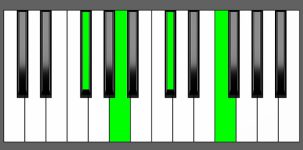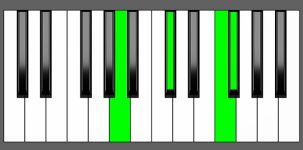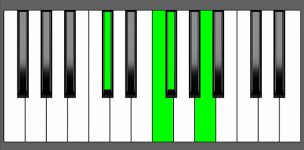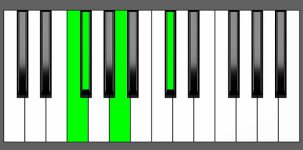Piano Diagram of GbmMaj7 in Root Position
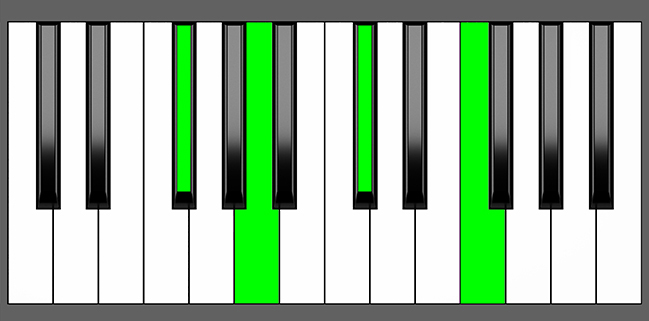
The GbmMaj7 chord is a minor chord rooted in the key of Gb, consisting of the notes Gb, Bbb, Db, and F. The main feature of this chord is the inclusion of a major 7th interval on a minor chord. Additionally, the presence of an augmented fifth between the minor 3rd and major 7th creates a sense of dissonance. In this article, we will delve into the music theory of the GbmMaj7 chord and its role within chord progressions.
Structure of GbmMaj7
Notes |
|---|
| Gb, Bbb, Db, F |
Intervals |
|---|
| R, m3, 5, 7 |
Finger Position
Left Hand |
|---|
| 5, 3, 2, 1
5, 4, 2, 1 |
Right Hand |
|---|
| 1, 2, 4, 5
1, 2, 3, 4 |
GbmMaj7 Chord Inversions
The GbmMaj7 chord has a total of 3 inversions:
| Root Position: | Gb | Bbb | Db | F |
| 1st Inversion: | Bbb | Db | F | Gb |
| 2nd Inversion: | Db | F | Gb | Bbb |
| 3rd Inversion: | F | Gb | Bbb | Db |
Piano Keyboard Diagrams
Music Theory and Harmony of GbmMaj7
Building the GbmMaj7 Chord: Different Approaches
Starting from the Gb Major Scale
A Gb minor major 7th chord is formed by taking the root note Gb, adding a minor 3rd interval Bbb (A), a perfect 5th interval (Db), and finally a major 7th interval (F). Although these intervals are typically derived from a minor scale, for educational purposes, it is often more intuitive to explain their construction using a major scale.
For example, to build a GbmMaj7 chord, you can start with the Gb Major scale:


To create a GbmMaj7 chord, apply the formula R, m3, 5, 7 in the following manner:
- Begin with the Root note, which is Gb.
- To obtain a minor 3rd interval from a major 3rd, you need to lower it by a half-step. In this case the major 3rd is Bb so the corresponding minor 3rd would be A. However, to maintain the original interval structure of the chord, we refer to it as Bbb instead of A.
- Include the 5th note, Db.
- Finally, add the major 7th interval (F), which is the 7th note of the scale.
By following this simple formula, you can create a minor major 7th chord from any major scale.
by Combining Intervals
Another way to form a minor major 7th chord is by combining specific intervals – a minor 3rd, a major 3rd, and another major 3rd.
m3 + 3 + 3 = minor Major 7th chords
If we observe the intervals between the notes, we can notice that:
- Gb-Bbb (A) creates a minor 3rd interval,
- Bbb-Db forms a major 3rd interval,
- and Db-F is another major 3rd interval.
By stacking these three intervals together, we can build the GbmMaj7 chord.
How to Use GbmMaj7 in a Chord Progression
The GbmMaj7 chord is characterized by the presence of a major 7th interval, which is not found in either the natural minor or major scales. It’s diatonic in other scales like the harmonic and melodic minor scale, which features a minor major seventh chord on their first degree.
Typically, the GbmMaj7 chord is used as a passing chord, temporarily transitioning towards a more stable Gbm7. Additionally, it can serve as an ending chord in specific musical contexts. This is because the chord produces a mysterious and intriguing atmosphere, making it suitable for certain musical styles and compositions.
Non-diatonic positions in Natural minor and Major Scales
The major seventh interval of the GbmMaj7 chord, which is F, clashes with the E note present in both natural minor and major scales. For this reason, the GbmMaj7 chord is not commonly used as a standalone chord (except in endings).
The GbmMaj7 chord is used:
- on the first and fourth degree of minor scales or
- on the second and on the sixth degree of major scales,
- as part of a chromatic progression towards a minor 7th chord.
- While less common, it can still be used on the fifth degree of both minor and major scales.
Here are the tables of the major and natural minor scales that include the Gb minor 7th, which can be complemented by a DbmMaj7 chord, however, since Gbm7 occurs only in theoretical keys, we will refer to its enharmonic equivalent keys.
on Natural minor Scales
| Minor Scales | i | ii | III | iv | v | VI | VII |
|---|---|---|---|---|---|---|---|
| Gb = F# | F#m7 ⇒ F#mMaj7 = GbmMaj7 |
G#m7b5 | A Maj7 | B min7 | C# min7 | D Maj7 | E7 |
| Db = C# | C# min7 | D#m7b5 | E Maj7 | F#m7 ⇒ F#mMaj7 = GbmMaj7 | G# min7 | A Maj7 | B7 |
| Cb = B | B min7 | C#m7b5 | D Maj7 | E min7 | F#m7 ⇒ F#mMaj7 = GbmMaj7 | G Maj7 | A7 |
Non-diatonic passing chord to the:
- Tonic chord in F# minor as F#mMaj7
- Subdominant chord in C# minor as F#mMaj7
- Dominant chord in B minor (less common) as F#mMaj7
on Major Scales
| Major Scales | I | ii | iii | IV | V | vi | vii |
|---|---|---|---|---|---|---|---|
| Fb = E | E Maj7 | F#m7 ⇒ F#mMaj7 = GbmMaj7 | G# min7 | A Maj7 | B7 | C# min7 | D#m7b5 |
| Ebb = D | D Maj7 | E min7 | F#m7 ⇒ F#mMaj7 = GbmMaj7 | G Maj7 | A7 | B min7 | C#m7b5 |
| Bbb = A | A Maj7 | B min7 | C# min7 | D Maj7 | E7 | F#m7 ⇒ F#mMaj7 = GbmMaj7 | G#m7b5 |
Non-diatonic passing chord to the:
- Supertonic chord in E Major as F#mMaj7
- Mediant chord in D Major as F#mMaj7
- Submediant chord in A Major as F#mMaj7
GbmMaj7 as Passing Chord in Gb minor
GbmMaj7 as Passing Chord in Db minor
GbmMaj7 as Passing Chord in Cb minor
GbmMaj7 as Passing Chord in Fb Major
GbmMaj7 as Passing Chord in Ebb Major
GbmMaj7 as Passing Chord in Bbb Major
Alternative Names for GbmMaj7
- Gb mΔ
- Gb mM
- Gb m7+
- Gb mΔ7
- Gb m(Δ)
- Gb mM7
- Gb minΔ
- Gb m(+7)
- Gb m(Δ7)
- Gb minΔ7
- Gb minorΔ
- Gb m(maj7)
- Gb m(Maj7)
- Gb minMaj7
- Gb min maj7
- Gb m(Maj7th)
- Gb minor major 7th
- Gb minor major seventh
